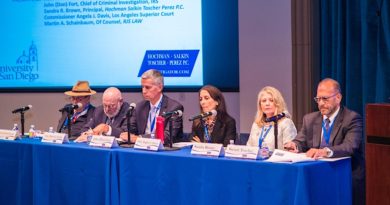CONNECT — a worldwide model for technology and life science innovation Organization celebrates 25 years of fostering job-generating businesses
By Duane Roth and Mary Walshok
In the early 1980s, the San Diego regional economy was in crisis. Traditional industries were on the decline, the business attraction efforts of economic development professionals were challenged and regional leaders were searching for a path to economic renewal and growth. The research institutions on the Torrey Pines Mesa had been quietly incubating innovative companies such as IMED, IVAC, LINKABIT, SAIC and Hybritech. At that time, community visionaries posed the provocative question, “Based on the strength of our research institutions, could we build a technology and life sciences industry for San Diego similar to the hub in Silicon Valley?”
Twenty-five years later, the San Diego economy has been transformed into one of the leading innovation hubs in the world. Today our city is home to thousands of technology and life science businesses representing fully 25 percent of the wages paid and a median income equal to leading business centers like New York, Chicago and San Francisco.
How did this exciting transformation happen? In 1985, a small group came together to create the CONNECT Program as a way to translate San Diego’s growing research capabilities into commercially viable products and businesses that would ultimately increase the prosperity of the region. In 1986, Bill Otterson, chairman of Lexocorp, was hired to head the program. He created a culture of collaboration that has become a hallmark of San Diego’s innovation economy and built the volunteer core that helped us address the many challenges our region faces in technology commercialization including a severe lack of management talent and venture capital, particularly for research discoveries.
Today CONNECT is widely regarded as the United States’ most successful community-based program linking high technology and life sciences entrepreneurs with the resources that they need for success: technology, money, markets, management, partners and support services. The organization is an independent nonprofit organization with offices in San Diego and Washington, D.C. With the support of 1,500 volunteer business leaders and a small paid staff, we deliver 330 programs hosting more than 10,000 attendees each year. As a testament to the impact, this month Inc. magazine has spotlighted CONNECT as one of 20 business incubators across the U.S. working to transform the raw materials of ideas into fully formed, job-generating businesses.
Regions around the world are attempting to emulate San Diego’s transformation into an innovation economy. The CONNECT program has now been modeled in almost 40 regions around the world and most recently New York City joined the list. In February, the speaker of the New York City Council announced plans to create NYC High-Tech CONNECT modeled on San Diego’s CONNECT program to help facilitate regular and frequent connections among scientists, investors and other components of the tech economy.
Nowhere is there more interest in CONNECT as a model, than in our nation’s capital, where commercialization of innovation has been recognized as a way of re-energizing our nation’s economy and protecting our position of leadership on the world stage. As Secretary of Commerce Gary Locke indicated at a February R&D Commercialization Forum at the National Academy of Sciences: “Even in areas where we are allocating enough funding for R&D, we’re not doing a good enough job getting these ideas quickly into the marketplace. With millions of Americans out of work, and our competitors aggressively chasing the same high-growth industries that we are, the United States cannot afford to merely fund research and say a prayer that some entrepreneur will commercialize it down the road. ” The Department of Commerce, the Brookings Institute and the Kauffman Foundation are viewing CONNECT as one of the prototypes that could help power up economically disadvantaged regions.
While others look to us as a model — our challenge of the moment is to sustain our region’s ability to continuously innovate and build clusters as new scientific breakthroughs occur and new technologies become ready for commercialization. In particular we are challenged to assist researchers and early stage companies through the “valley of death” — the period between discovery and commercialization where funding dollars from angel investors and venture capitalists are hard to come by. In order to do this, CONNECT has made a series of commitments for the next 25 years, which will enhance the region’s ability to continue to grow and be competitive, in meeting what today is not just a national challenge but an international challenge. Priority initiatives include:
• Publishing the quarterly CONNECT Innovation Report, which contains unique information on the pace of research and development, local innovation start-up activity and employment and investment data of value to regional economic developers and business and government leaders.
• Launch of a Web-based CONNECT CALIT2 grants portal to enable entrepreneurs in early-stage development companies to gain instant access to all available federal grants.
• Pairing successful innovators with classrooms to stimulate interest in science and technology careers through partnerships with Biogen Idec, Qualcomm and others – thereby creating the workforce of science and engineering talent.
• Establishing an office and full time presence in Washington, D.C. to represent San Diego’s innovation economy on innovation issues, including among others, intellectual property, trade, anti-trust, regulation, workforce development, federal research funding and access to capital.
We are working in close partnership with all of San Diego’s trade associations including BIOCOM, CommNexus, CleanTECH San Diego, the San Diego Software Industry Council, Tech America and the Wireless Life Science Alliance in order to further build our region’s capacity for innovation and commercialization on the world stage.
Duane Roth is CEO of CONNECT. Mary Walshok is the associate vice chancellor for extended studies and public programs at UCSD and co-founder of CONNECT.



